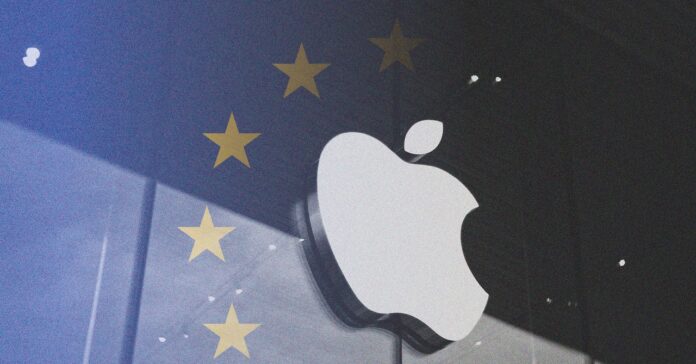Apple is among three tech giants being investigated for failing to comply with the European Union’s new competition rules, in another blow to the embattled smartphone maker.
Apple was the primary focus of an EU press conference on Monday morning. But authorities also opened formal investigations into Meta and Alphabet, Google’s parent company. The trio are the first to be subject to formal probes under the EU’s new Digital Markets Act, the bloc’s landmark competition law, which took effect on March 7.
Under the new rules, six of the world’s largest tech companies, known in the EU as “gatekeepers,” were asked to provide evidence that they were not harming competition. “We are not convinced that the solutions by Alphabet, Apple, and Meta respect their obligations for a fairer and more open digital space for European citizens and businesses,” said Thierry Breton, EU industry chief, in a statement on Monday. “Should our investigation conclude that there is lack of full compliance with the DMA, gatekeepers could face heavy fines.” Under the Digital Markets Act, officials can levy fines of up to 10 percent of tech giants’ global revenue or 20 percent for repeat violations.
Following weeks of criticism directed at Apple by developers, the EU’s competition chief Margrethe Vestager said a formal investigation would focus on two elements of the smartphone maker’s business: the limits Apple places on developers trying to link from the App Store to their own websites, and how hard Apple makes it to replace default, native apps like Photos or iCloud with third-party alternatives.
“Gatekeepers have an obligation to enable easy uninstallation of apps and easy change of default settings,” Vestager said in the press conference. “Apple’s compliance model does not seem to meet the objective of this obligation.”
EU officials are also considering another formal investigation into whether Apple’s rules for alternative app stores—allowing users to download apps from places other than the official App Store—comply with the Digital Markets Act rules. Apple is confident its business is compliant, company spokesperson Rob Saunders told WIRED. “Teams across Apple have created a wide range of new developer capabilities, features, and tools to comply with the regulation,” he said in a statement. “At the same time, we’ve introduced protections to help reduce new risks to the privacy, quality, and security of our EU users’ experience.”
Apple has emerged as a focal point for competition officials in both the EU and the US. The EU announcement on Monday follows a lawsuit filed by the US Department of Justice last week that claimed the smartphone maker had established an iPhone monopoly that was suppressing competition and harming consumers.
The lawsuit cited four internal Apple emails that, the DOJ claimed, illustrate how executives knowingly restrict users and developers in unfair ways. In one exchange from 2010, Apple cofounder Steve Jobs and an unnamed Apple executive discussed how a new ad for Amazon’s Kindle gave the impression that it is easy to switch from iPhone to Android. “Not fun to watch,” the executive wrote.
The Apple crackdown also comes amid wider scrutiny of the ways tech giants have managed to maintain dominance. On Monday, the EU announced Alphabet was also subject to a formal investigation into the limits placed on developers selling their apps through the Android apps store. A US court ruled that the Google Play Store was a monopoly in December of last year.
EU officials added that they were concerned by the way Alphabet ranks results in Google Search, according to EU industry chief Thierry Breton. “Gatekeepers should not use their power to promote their own services over their rivals and ranking should be based on transparent, fair, and non discriminatory terms,” Breton said in Monday’s press conference. “Based on our preliminary assessment, this does not seem to be the case when it comes to how results are presented on Google search.”
Google plans to defend its approach. “To comply with the Digital Markets Act, we have made significant changes to the way our services operate in Europe,” said Oliver Bethell, the company’s director of EMEA competition, in a statement. “We have engaged with the European Commission, stakeholders and third parties in dozens of events over the past year to receive and respond to feedback, and to balance conflicting needs within the ecosystem.”
Meanwhile the Meta investigation will focus on the company’s “pay or consent” model, Breton said. In November, Facebook-parent Meta announced that its users could opt out of seeing ads for a fee of $10 a month. After critics suggested users were essentially being asked to pay for privacy, the company offered last week to halve that monthly price to 5.99 euros ($6.50).
“This has forced millions of users across Europe into a binary choice: pay or consent,” said Breton, in the press conference, noting that if users consent, their data from messaging app Messenger can be used for targeted ads on Instagram. “We have serious doubts that that consent is really free when you are confronted with a binary choice.”
Ad-free subscriptions are a well-established business model, Meta spokesperson Matthew Pollard told WIRED. “We designed Subscription for No Ads to address several overlapping regulatory obligations, including the DMA,” he said.
The Digital Markets Act dictates investigations should be concluded in 12 months. It’s unclear how the deadline will be affected by the European elections, which are due to take place in June.
Source : Wired















